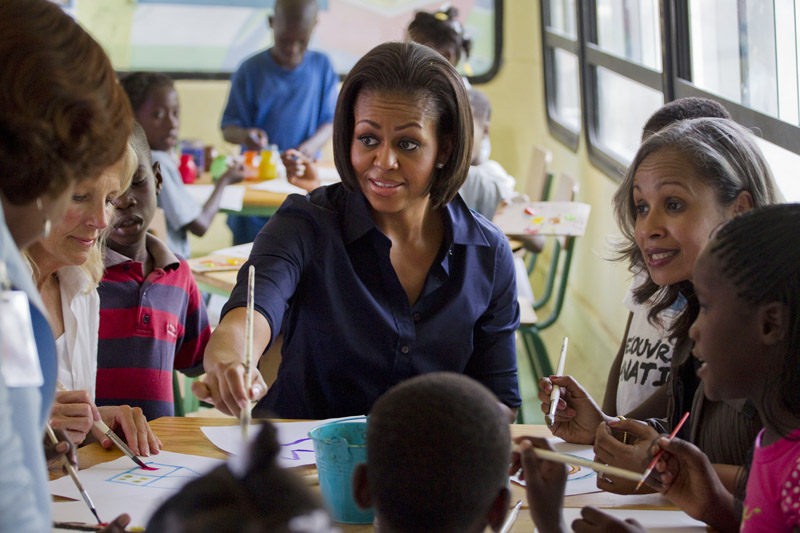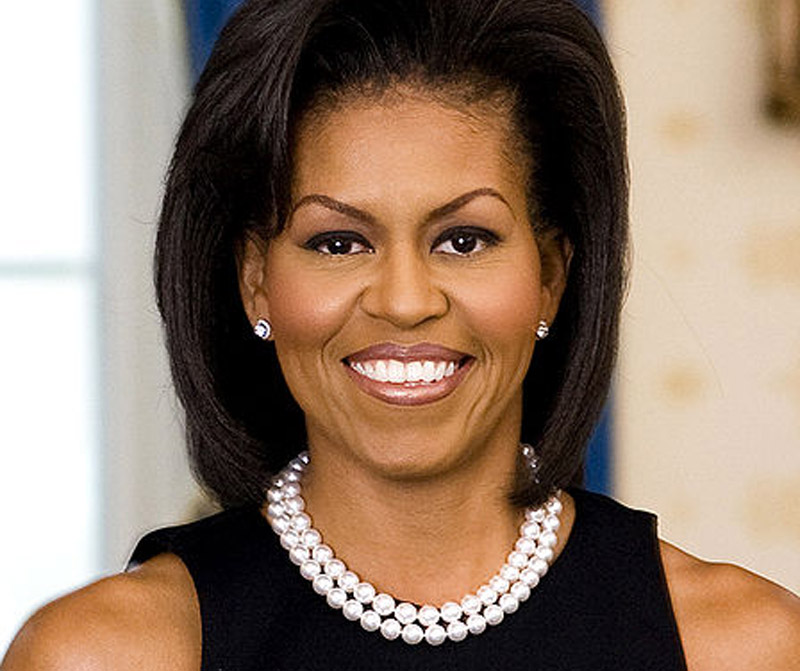WASHINGTON — Today, first lady Michelle Obama will travel abroad. She has already visited nine countries since moving into the White House. But this time, when she arrives in Mexico, she will be a solo star on the world stage. Her three-day journey to Mexico City will be her first official foreign trip alone – without the president and without her children. She will use it to amplify and articulate a singular message to young people: self-determination.
Recent first ladies have often been at their most provocative when they’ve traveled abroad. As first lady, Hillary Rodham Clinton traveled to China for the U.N. Fourth World Conference on Women in 1995 to deliver a major address. In the weeks leading up to her speech, Clinton administration officials debated whether it was wise for her to go, whether she should confront China on its human rights abuses and how it should be done. She ended up delivering her now-famous speech in which she equated women’s rights and human rights. “If there is one message that echoes forth from this conference,” Clinton said, “it is that human rights are women’s rights, and women’s rights are human rights once and for all.”
Observers worried that the comments would turn out to be politically devastating. But in an interview with reporters after the fact, Clinton said: “We are working towards having a very comprehensive and hopefully good relationship with China in many areas. For me, it was important to express how I felt and to do so as clearly as I could.”
In 2002, when Laura Bush was in Prague on her first overseas trip alone, she delivered a 13-minute address on Radio Free Europe in which she stumped for women’s rights in Afghanistan. “I want you to know that the isolation the Taliban regime forced on you is not normal,” she said. “Before the Taliban, women were elected representatives in Afghanistan’s parliament and women were a vital part of Afghanistan’s life. I hope you will be again, because a society can only achieve its full potential when all of its members participate.” The comments were broadcast to 28 countries, including Afghanistan.
In 2005, Bush followed up with a visit, under heavy security, to a teacher training institute.
“When I first interviewed with her in 2004, that was the first thing she said, ‘I want to go to Afghanistan,’ ” recalls Anita McBride, her chief of staff from 2005 to 2009. “She’d been talking about going. She’d been meeting with Afghan women quietly at the White House. But she had been prevented from going for a number of reasons. That was my first responsibility.”
In embarking on her first solo trip, Obama is following an agenda that her staff will describe only in the broadest of terms: It is meant to underscore “the president’s commitment to advancing mutual interests, mutual respect and mutual responsibility between nations and peoples around the world.”
But in the days before her departure, the East Wing got more specific and more ambitious, declaring the trip “the kickoff of the first lady’s international agenda,” with a focus on “youth engagement.” Most of the world’s population is under the age of 25, said an administration official, and “as a society we have a responsibility to support and nurture them.”
Obama will be in Mexico City for a total of about 40 hours and is not expected to travel outside the capital. She will speak to young people — from primary-school students to recent college graduates — encouraging them to become active in their communities and take responsibility for their own future.
The Obama White House, over the course of a year and a half, has been particularly attentive to Mexico, and the first lady’s trip underscores the breadth and depth of this country’s relationship with its southern neighbor. According to the White House, 1 million people cross the U.S.-Mexico border every day and $1 billion in trade passes through that border every 24 hours.
When President Barack Obama traveled to Mexico in April 2009, he noted: “There is a reason why the first visit that I had with a foreign leader after my election was with President (Felipe) Calderón. It was a reminder, as John F. Kennedy said, that the bonds between our two countries cannot be broken.”
In February of this year, Mexican first lady Margarita Zavala visited Michelle Obama in the White House, where the two reportedly discussed obesity –– Obama’s signature issue and a problem that also plagues Mexico –– as well as diabetes, addictions and undocumented minors in the United States.
On May 19, the Mexican president and first lady will be the guests of honor at a White House state dinner –– the second such dinner organized by the Obama administration and the first for new social secretary Julianna Smoot. (Decisions related to the dinner and the first lady’s visit were discussed at the same time but not strictly coordinated. The timing of the two events was more of a coincidence, according to an administration official.)
Michelle Obama, 46, and Zavala, 42, have met on several occasions — although Obama has never been to Mexico and does not speak Spanish — and have more than a few things in common. “Both are lawyers. Both are women with a story and a career of their own,” says Rossana Fuentes Berain, a media executive in Mexico, who is friendly with Zavala. Both women decided to “step back for a while and let their husbands take the front role, allowed them to have their life dream of public service.”
Both women also have made the welfare of children the centerpiece of their agenda as first lady. Zavala has been especially focused on migrant youth. The two women will have a private meeting at Los Pinos, the residence of the Mexican president and first lady. The couple also will host Obama at a dinner.
Obama will arrive in Mexico in the aftermath of the H1N1 epidemic that shut down much of Mexico’s capital last year and wounded the tourism industry. The U.S. recession, devastating to many communities here, sent massive tremors through the Mexican economy thanks to a declining demand for Mexican exports. The flow of money into Mexican villages and towns from migrant workers living in the United States also dried up as jobs disappeared.
Most recently, the drug-gang violence concentrated along the border between Ciudad Juarez and El Paso has spawned deadly shootings. Last month, gunmen ambushed and killed three people connected to the U.S. Consulate in Juarez. As secretary of state, Hillary Clinton led a delegation of Cabinet officials to Mexico in March. In her remarks, she noted that the appetite for illegal drugs in the United States and this country’s failed anti-narcotics policies have contributed to the rampaging violence.
Although the first lady has been briefed on the drug trafficking, there are no plans to raise the issue during her largest event: an address to high school and university students. Still, “it’s pretty hard to ignore the here and now,” McBride noted. “If something is in the news, sensitive or not, you have to respond to it in some way.”
Often, though, first ladies spend a significant part of their time on the road engaged in cultural affairs. Michelle Obama, for instance, will tour the Museo Nacional de Antropología (National Museum of Anthropology). It would be unwise to be dismissive of visits to museums, landmarks and such, even though they don’t have the drama of, say, flying into a war-torn country on a plane filled with care packages, McBride says. “I’d have to argue on behalf of cultural events. It’s a recognition of cultural identity; it’s something countries see as significant and important to who they are,” McBride says. “When you visit a cultural institution or a performing arts event, in the world of diplomacy, it matters. It matters in a big way.”
The American first lady is also uniquely influential on the world stage. “No other spouse of a head of state has a de facto government position,” Gutin says. “It’s intentionally fuzzy. As the first lady, you have a chance to assert in a quiet way, ‘I speak for the government.’ Or to say, ‘I don’t speak for the government.’ You can have it both ways.”
As a result, the first lady can serve as the most humane face of an administration. “It gives you the freedom to be a representative of the country in the most positive way,” McBride says. “Our country looks to the first lady to be a goodwill ambassador.”
And goodwill always counts as an asset on the balance sheet. “She’s choosing her first international visit to be done to the neighbor that is in trouble,” Berain says. “When the dust settles, you remember who called you.”
Send questions/comments to the editors.




Success. Please wait for the page to reload. If the page does not reload within 5 seconds, please refresh the page.
Enter your email and password to access comments.
Hi, to comment on stories you must . This profile is in addition to your subscription and website login.
Already have a commenting profile? .
Invalid username/password.
Please check your email to confirm and complete your registration.
Only subscribers are eligible to post comments. Please subscribe or login first for digital access. Here’s why.
Use the form below to reset your password. When you've submitted your account email, we will send an email with a reset code.